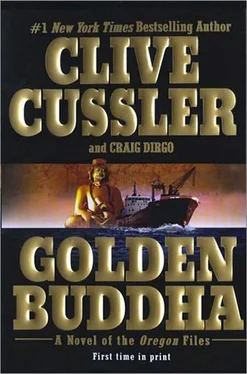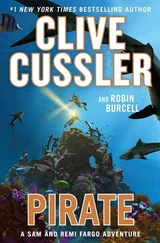Clive Cussler - Golden Buddha
Здесь есть возможность читать онлайн «Clive Cussler - Golden Buddha» весь текст электронной книги совершенно бесплатно (целиком полную версию без сокращений). В некоторых случаях можно слушать аудио, скачать через торрент в формате fb2 и присутствует краткое содержание. Жанр: Морские приключения, на английском языке. Описание произведения, (предисловие) а так же отзывы посетителей доступны на портале библиотеки ЛибКат.
- Название:Golden Buddha
- Автор:
- Жанр:
- Год:неизвестен
- ISBN:нет данных
- Рейтинг книги:3 / 5. Голосов: 1
-
Избранное:Добавить в избранное
- Отзывы:
-
Ваша оценка:
- 60
- 1
- 2
- 3
- 4
- 5
Golden Buddha: краткое содержание, описание и аннотация
Предлагаем к чтению аннотацию, описание, краткое содержание или предисловие (зависит от того, что написал сам автор книги «Golden Buddha»). Если вы не нашли необходимую информацию о книге — напишите в комментариях, мы постараемся отыскать её.
Golden Buddha — читать онлайн бесплатно полную книгу (весь текст) целиком
Ниже представлен текст книги, разбитый по страницам. Система сохранения места последней прочитанной страницы, позволяет с удобством читать онлайн бесплатно книгу «Golden Buddha», без необходимости каждый раз заново искать на чём Вы остановились. Поставьте закладку, и сможете в любой момент перейти на страницу, на которой закончили чтение.
Интервал:
Закладка:
The man who carefully removed the cars from inside the 747 was of medium height with thick brown hair. As soon as the last car, the Corvette, was on the runway, he reached into the glove box, removed a letter, then climbed out and lit up a Camel filter.
“You must be the general,” he said to a man approaching followed by a dozen soldiers.
“Yes,” the general said.
“I’m Keith Lowden,” the man said. “I was told to give you this.”
The general scanned the letter, folded it and placed it in his rear pants pocket. “These all original?”
“They are,” Lowden said. “The serial numbers all match.”
Lowden then motioned to the general to walk over to the Superbird and started explaining the car, the documentation and the rare options. By the time Lowden had finished with the second car, the Boss 302, the general stopped him.
“You want—” he started to say just as Lowden’s cell phone rang.
“Sorry,” Lowden said as he answered. He listened for a minute, then turned to the general.
“They want to know if it’s a deal,” he said, placing his hand over the telephone.
The general nodded his head in the affirmative.
“He said okay,” Lowden said.
A second later he hung up the telephone and turned back to the general. “Now, what were you about to ask me?”
“I was wondering if you had time to spend the night here in my country,” the general said, “so we might talk about the cars.”
“I don’t know,” Lowden said, smiling. “This country have any beer?”
“Some of the best,” the general said, smiling back.
“Good,” Lowden said. “’Cause you can’t talk cars when you’re thirsty.”
PO and his team were searching throughout Lhasa, but they had yet to turn up a single U.S. or European citizen. The six members of his team were all Tibetan, and Po didn’t care for them much. First of all, like most people, he hated traitors—and any way you sliced it, Tibetans that worked for the PSB had sold out to the Chinese. In the second part, the men appeared lazy; they did the questioning in a haphazard fashion and didn’t seem to be committed to finding the people Po was seeking. Thirdly, for being members of the country’s crack police service, they didn’t seem to have much training in police procedures.
Po, for his part, had little choice, so he doubled his own efforts and hoped for the best.
“THE son-of-a-bitches,” Cabrillo said angrily, “it’s like putting an atomic bomb in the Vatican.”
Zhuren had just given them the site of the poison gas. It was in Potala, the home of the Dalai Lama, and one of the most sacred of structures in all of Tibet. The Chinese plan was evil, but ingenious. Potala sat on a hill outside of town; if one waited until the winds were right, you could blanket Lhasa in a matter of minutes.
Seng nodded, then reached for his beeping radio. “Go ahead, Oregon ,” he said.
“Is Cabrillo there with you?”
“Hold on,” Seng said, handing him the radio.
“Juan,” Hanley said quickly, “we have the votes. All you need to do is keep it together for another few hours and help will be on the way.”
“What’s the latest on the Russians?” Cabrillo asked.
“They’re five hours from the Mongolian-Tibetan border,” Hanley said, staring at the large monitor on the wall, “give or take.”
“Call and have them slow the tank column down,” Cabrillo said. “If they reach the border before the vote, we could have World War Three on our hands.”
“I’ll do it,” Hanley said. “Now, what’s happening on the ground?”
“I just found out the Chinese have one last trick up their sleeve,” Cabrillo said. “A doomsday gas.”
“Do you know the location and type?” Hanley said.
Cabrillo rattled off the chemical composition.
“We’ll get to work here figuring out how to render the gas inert,” Hanley said.
“Good,” Cabrillo said. “That frees me up to pinpoint the exact location.”
“Somehow,” Hanley said, “I knew you were going to say that.”
45
THE Oregon was surging into the Bay of Bengal in preparation for the team’s extraction. Word of the street fighting in Lhasa had reached the news media. Television crews, newspaper and magazine reporters, and radio teams were making final preparations to enter the country. To maintain the veil of secrecy necessary for the Corporation to conduct business, they needed to be away from Tibet before the reporters appeared.
So far the plan had worked like clockwork, but there was still a wild card to contend with.
The Russian ruse had successfully tied up the Chinese army far to the north, but the risk now was from the Chinese air force. If Beijing ordered squadrons of bombers and fighter planes to attack the country, the results would be catastrophic. The Dungkar forces had limited means to wage ground-to-air warfare. Carpet bombing of Lhasa would result in heavy losses.
The only hope was if the news media could shine the beacon of truth on China.
If the world could be shown via television that the Tibetans had overthrown their oppressors on their own and that the control of Tibet was in the hands of the people and their divine leader the Dalai Lama, then any bombing by China would be taken for what it was—a senseless act of brutality. The ensuing worldwide condemnation would be a burden even China could not bear.
Hanley placed a call to Bhutan and ordered the C-130 to prepare to evacuate his team.
“CLIMBER one,” Murphy said, “to Rescue.”
Gurt was steering the Bell 212 above a mountain plain with jagged peaks to each side. Several miles in the distance, the rescue helicopter was visible on the ground. As Murphy watched through his binoculars, the rotor blade started to spin, then gain speed until it was just a blur.
“Rescue One,” the radio squawked. “We have visual and will follow along.”
Murphy watched as the helicopter lifted into a high hover, then slowly began to move forward. Passing to one side, Murphy craned his head to the rear and confirmed they were in formation behind and to one side.
“How are you feeling?” he said over the intercom to Gurt.
“My shoulder feels like I’ve been kicked by a mule,” he noted, “but all in all, I’m not doing too bad.”
“I’d like to know what Gampo gave you,” Murphy said.
“Some ancient Tibetan potion,” Gurt said, staring at the gauges. “I just hope it lasts.”
“I spoke to the Oregon ,” Murphy said. “One of the backup pilots will fly you back to Bhutan.”
“Heck of a deal,” Gurt said. “I thought I was a goner.”
“Me too, old buddy,” Murphy said quietly. “Me too.”
FOR the Chinese, the battle for Lhasa was all but over. They had lost the initiative when King stopped the movement of the armored column. From that point on, the Dungkar forces had been seized by a rage that showed no boundaries.
Teams under the leadership of General Rimpoche had spread out through Lhasa, rounding up Chinese troops in their barracks and elsewhere. The war for the motor pool was bloody, but after forty minutes of fierce fighting, the Dungkar had taken control.
“This was all the red paint available in town,” a Dungkar warrior said as he slid to a stop inside the fenced yard of the motor pool.
General Rimpoche was sitting in the passenger seat of a Chinese jeep with a bloody bandage wrapped around his lower leg. A red-hot chunk of shrapnel from a fragmentary grenade had hit him as he was leading the last charge in the battle.
“Mark the captured armored personnel carriers and the three remaining tanks with the Dalai Lama’s symbol,” he said, coughing, “then alert our forces that these vehicles are under our control.”
Читать дальшеИнтервал:
Закладка:
Похожие книги на «Golden Buddha»
Представляем Вашему вниманию похожие книги на «Golden Buddha» списком для выбора. Мы отобрали схожую по названию и смыслу литературу в надежде предоставить читателям больше вариантов отыскать новые, интересные, ещё непрочитанные произведения.
Обсуждение, отзывы о книге «Golden Buddha» и просто собственные мнения читателей. Оставьте ваши комментарии, напишите, что Вы думаете о произведении, его смысле или главных героях. Укажите что конкретно понравилось, а что нет, и почему Вы так считаете.












